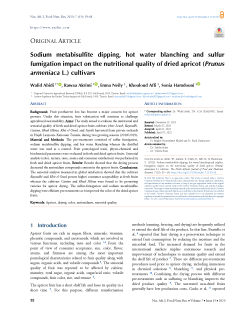Main Article Content
Sodium metabisulfite dipping, hot water blanching and sulfur fumigation impact on the nutritional quality of dried apricot (Prunus armeniaca L.) cultivars
Abstract
Background: Fruit postharvest loss has become a major concern for apricot growers. Under this situation, fruit valorization will continue to challenge agricultural sustainability.Aims: The study aimed to evaluate the nutritional and sensorial quality of fresh and dried apricot fruits cultivars (Amr Leuch, Bayoudhi, Canino, Khad Hlima, Khit el Oued, and Sayeb) harvested from private orchards in Hajeb Laayoun- Kairouan Tunisia, during two growing seasons (2018/2019). Material andMethods: The pre-treatments consisted of sulfur fumigation, sodium metabisulfite dipping, and hot water blanching whereas the distilled water was used as a control. Fruit pomological traits, physic-chemical and biochemical parameters were evaluated in fresh and dried apricot fruits. Sensorial analysis (color, texture, taste, aroma and consumer satisfaction) was performed in fresh and dried apricot fruits. Results: Results showed that the drying process decreased the antioxidant compounds content in the apricot fruits. Conclusions:The sensorial analysis measured in global satisfaction showed that the cultivars Bayoudhi and Khit el Oued possess higher consumer acceptability as fresh fruits whereas the cultivars Canino and Khad Hlima were found to be promising varieties for apricot drying. The sulfur-fumigation and sodium metabisulfite dipping were efficient pre-treatments as it improved the color of the dried apricot fruits.







